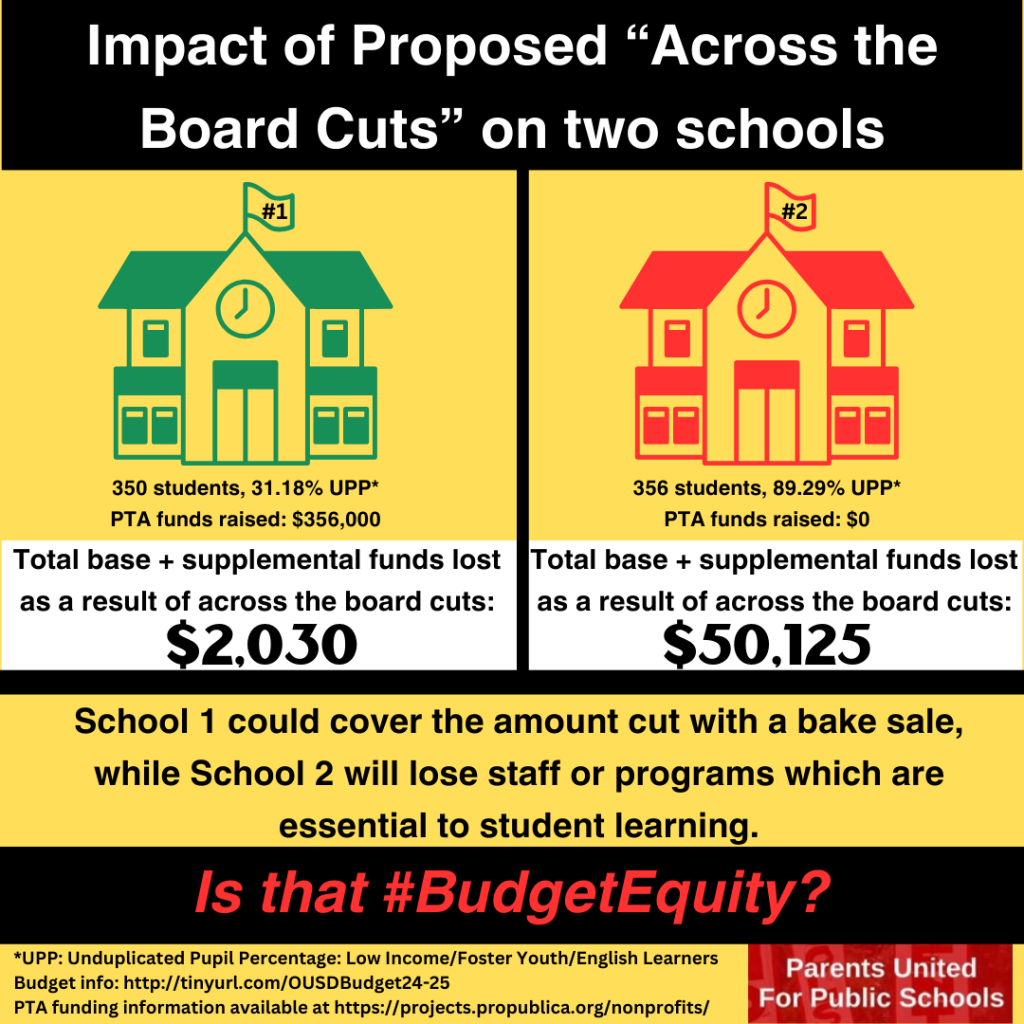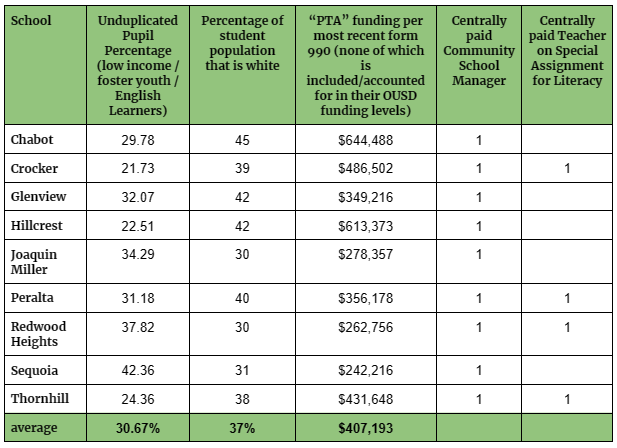
School budgeting is complicated. Right now, site principals are trying to create budgets for their schools from a “one pager” – the budget document created every January for each school showing how much money and staff that they will receive in the following year1. We know, because the board approved budget “adjustments” for 2024-25 as part of last year’s long-term budget planning2, that school sites will lose $10 – 20 per student (dependent on grade level) in “base” funds, and also $110 per student in “Supplemental” funds received based on their Unduplicated Pupil Percentage (“UPP”)3. UPP is measured by counting the number of low-income students, English learners and Foster Youth in a school community and converting that to a percentage4. It is easy to understand how cutting the Supplemental funds across the board disproportionately harms the primarily Black and Brown students who generate the Supplemental funds in the first place – the more wealth in a school community, the smaller the cut.
But it is also true that “across the board” cuts in Base (per pupil) funding disproportionately impacts lower income communities who do not have other means to make up the difference.

In 2017 when faced with drastic budget cuts, some board members asked for a more “equitable” process than the “across the board” strategy, and staff responded that it was just too difficult:
“Sondra Aguilera, deputy chief of student services for OUSD, told board members Wednesday that this is the “best option.” She said a more tailored approach for cutting the budget at each school would be difficult, in part because some parent-teacher associations raise their own grants but are not required to report those funds to the district. “We began to see this rabbit hole that we were going to go down mapping all the different sources,” Aguilera said. “You can’t possibly map all the different sources that school sites receive.””
https://www.kqed.org/news/11635537/oakland-unified-proposing-9-million-in-midyear-budget-cuts-to-schools
OUSD is willing to implement “across the board” budget cuts which they know disproportionately impact low-income Black and Brown families because it’s harder to figure out how much money PTAs pull in for their schools.5 That is NOT #BudgetEquity.
Given that OUSD understands that “across the board cuts” disproportionately harm Black and Brown schools, why is OUSD giving even MORE of our students’ precious resources to higher income, whiter schools?
According to the OUSD School Site Funding Profile (“Proposed Budget”) the following wealthy, primarily white elementary schools are receiving “additional centrally provided” Community School Managers (“CSM”) (and a few are also receiving additional centrally provided Literacy Teachers on Special Assignment “TSAs”):

These schools are getting “free to them” Community School Managers despite the fact that they are not community schools6, and do not qualify as community schools per the California Community School Partnership Program (“CCSPP”) grant because their UPP is below the 50% threshold7. In fact, most of the schools on this list fall far short of that UPP and represent 9 of the 10 schools with the highest percentage of white students in OUSD.8 These schools collectively reported nearly $3.7 million in PTA revenue in their most recent disclosures.9
Some OUSD Community Schools receive partial funding for their CSM (about half of the cost) as part of their “enrollment based” staffing, but 10 schools receive no CSM allocation, and so must pay for their CSM out of their discretionary funds – thereby decreasing the amount left for important student services. It is hard to understand why OUSD, when considering which schools to “centrally provide additional” staff to in the most equitable way – a value which OUSD claims to hold at the center of everything they do – decided to provide “free to them” Community School Managers to elementary schools which are not Community Schools (and cannot qualify under CCSPP) instead of providing them to the 10 elementary schools which received NO allocation (not even partial) for their CSM. Given the history of anti-Blackness in OUSD, it is not surprising that 7 of the 10 elementary schools which received no CSM allocation are 7 of the Blackest elementary schools in OUSD10.
OUSD must redo the one pagers to reflect #BudgetEquity by eliminating “across the board” cuts and reallocating “centrally provided staffing” from affluent, white elementary schools to the primarily Black elementary schools which have NO allocation for Community School Managers.
Equity is not just a buzzword, it is enshrined in OUSD Board Policy 503211 which states: “we hold the powerful belief that equity is providing students with what they need to achieve at the highest possible level” and “to interrupt patterns of institutional bias at all levels of the organization”. Continuing to offer disparate and inequitable funding levels to majority Black schools is not interrupting that pattern. The OUSD board must direct staff to revise these and other areas of inequity in the budget to make the changes that are necessary to create #BudgetEquity.
- There are three general categories included in the One Pagers: (1) dollar allocations which schools can decide how they want to spend; (2) staff allocations based on enrollment and student population; and (3) centrally provided additional staff placed at the discretion of OUSD staff (which are “free” to the school and in addition to the staffing generally provided to other schools). ↩︎
- From a staff presentation to the Budget and Finance Committee on October 12, 2023. https://ousd.legistar.com/View.ashx?M=F&ID=12354388&GUID=E0330B30-D391-4BA3-BB28-C142E0CD19A5 ↩︎
- This is part of the “Local Control Funding Formula” (“LCFF”) adopted by California in order to provide more funding to school districts with higher proportions of higher need students. Beginning in 2013-14, school districts would receive equal “Base” funding per pupil, but also would receive “Supplemental” funding for higher need students, and “Concentration” dollars for the highest need students. OUSD, which has a UPP of 77.96% according to 2023-24 adopted budget, receives significant additional Supplemental and Concentration funding generated by its high need populations. For information about LCFF see https://publicadvocates.org/our-work/education/public-school-funding/lcff/ ↩︎
- The count is “unduplicated” because each student is only counted once, even if they fall into multiple categories. So if a student is a Foster Youth AND an English Learner, they are only counted one time. ↩︎
- That is not quite true. PTAs and similar “tax exempt” parent organizations are required to file federal forms called 990s that identify how much revenue is raised, and how that money is spent. You can find them on public websites like ProPublica: https://projects.propublica.org/nonprofits/ ↩︎
- There are two other Elementary schools which received this centrally provided additional staff member, Cleveland Elementary and Piedmont Avenue. Each of those schools meets the CCSPP threshold and are not included in this analysis as a result. ↩︎
- 50% is the base threshold, but the competitive grant threshold (in practice) was 80% UPP (https://cslx.org/assets/g-files/CCSPP-Grant-QA-V1.pdf). ↩︎
- The only affluent, white elementary school not on this list is Montclair Elementary which is 34% white and has an UPP of 29.49%. We are not clear on why only this “Hills” school was not included. ↩︎
- See the ProPublica website, ibid. ↩︎
- The elementary schools which did not receive a CSM allocation are, including percentage of African-American (AA) or Black students: Burckhalter (50%), Grass Valley (53%), Laurel (31%), Lincoln (9%), Montclair (12%), Carl Munck (43%), OAK (formerly Howard) (44%), Manzanita SEED (11%), Prescott (51%) and Sankofa (36%) ↩︎
- https://boepublic.ousd.org/Policies.aspx ↩︎
